'The clinicians said my physical fitness was a key factor in my ability to recover from the cancer': Cycling's amazing veterans
Older cyclists don’t only extend their healthy years, they keep alive the passion to strive. Rob Kemp meets eight indomitable over-50s

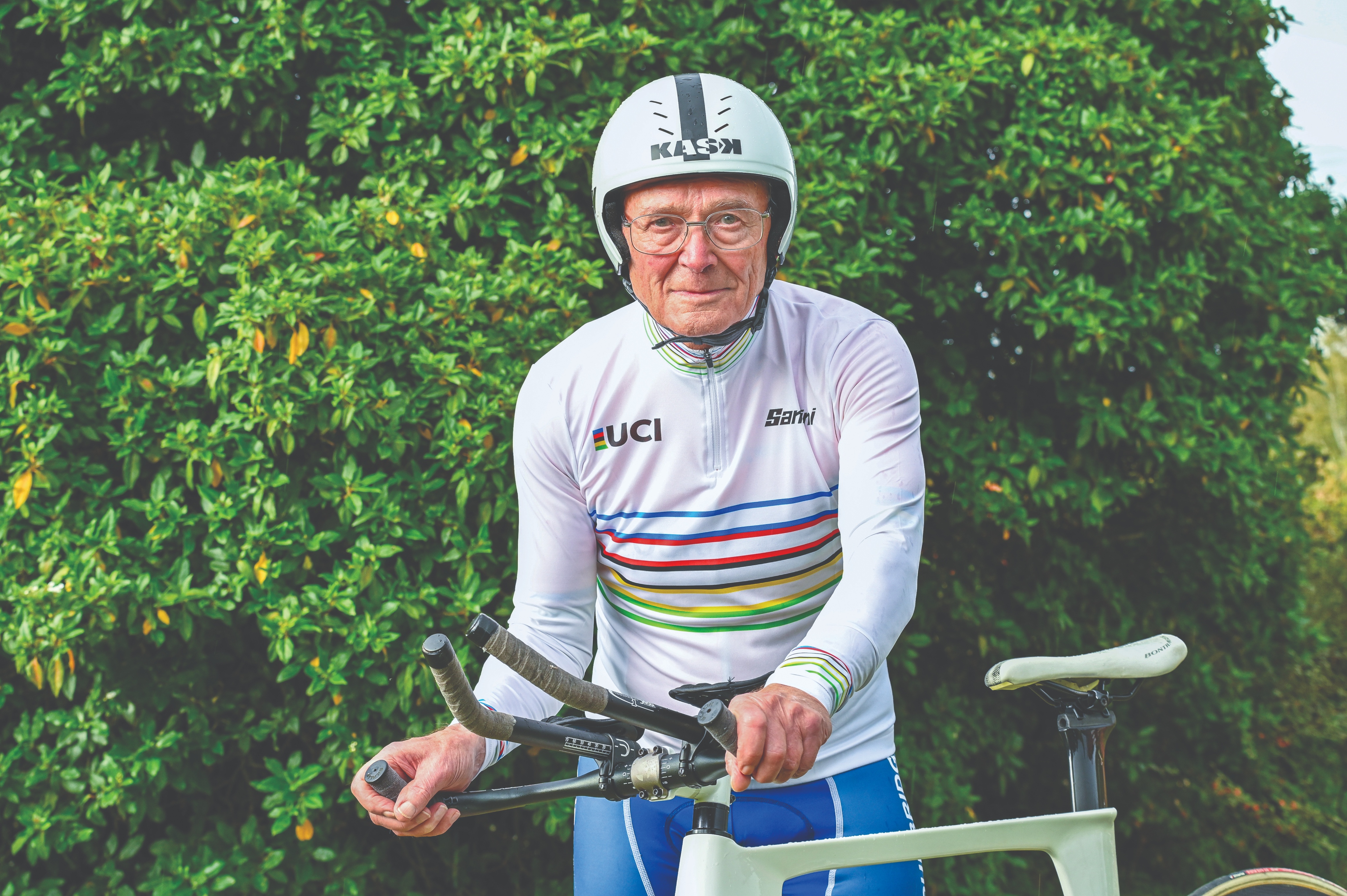
The latest race content, interviews, features, reviews and expert buying guides, direct to your inbox!
You are now subscribed
Your newsletter sign-up was successful
Cycling offers a multitude of benefits for older adults, including bolstering the immune system, maintaining muscle mass and strength, and regulating body fat and cholesterol levels, as revealed by multiple studies. The low-impact nature of the sport makes it ideal for those with joint issues – unlike high-impact exercises such as running. Because it’s so accessible and kind on the body, cycling is easy to take up later in life and to continue for decades. In a society of increasing isolation, the social interaction and camaraderie cycling offers can help combat mental health issues and loneliness too.
For many of those who’ve cycled since childhood – progressing to club and elite levels – the positive impact upon their health and wellbeing means they’re still smashing PBs and picking up medals in their 50s, 60s, 70s, 80s and beyond.
Cycling Weekly decided it was time to tap into their secrets and discover how you and I can keep riding strongly, if not forever, then at least for many more years to come.
Andy Bruce, 53, Dunfermline
- Scottish Hour record holder – 47.523km (March 2023)
- Masters world champion M50-54 – Points Race (2019)
- British Masters 3,000m individual pursuit champion (2019)
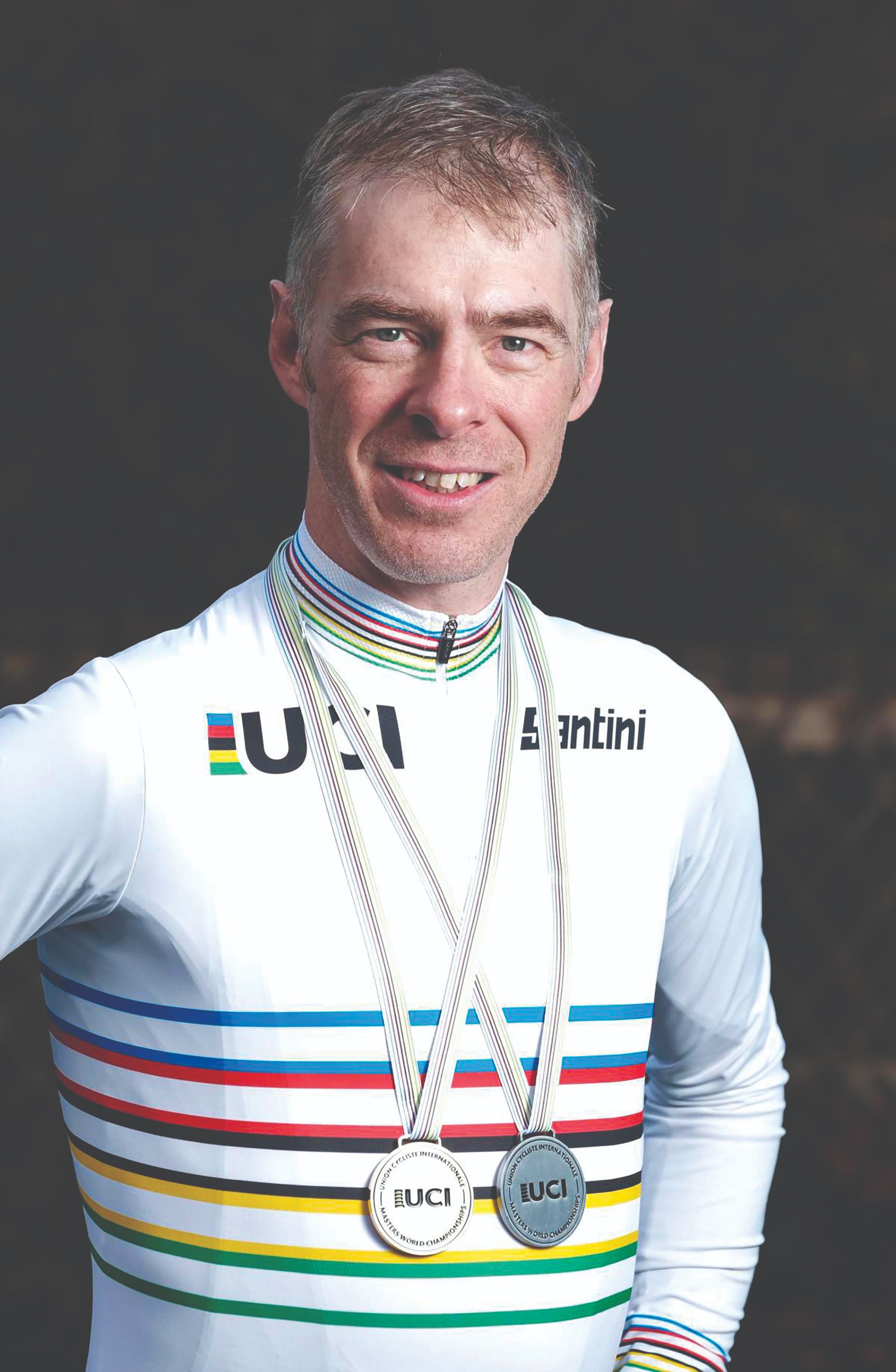
Andy Bruce took up cycling at the age of 39 with a bike bought through the cycle to work scheme. In the 14 years since, he has become one of the most successful age-group track riders in the world – claiming a masters track cycling World Championship title in 2019.
“In October 2023 I saw a post on the History of Scottish Cycling Facebook group, saying how the Scottish Hour record had stood unbroken for almost 30 years. After a back-of-a-fag packet calculation, I worked out that the record of 46.65km [set by Jim Gladwell] was an average of 19.2-second laps. ‘Can I do that? I probably can’.”
Bruce did an initial test at his local track. “I only did 10 minutes, aiming for about 18.7 seconds per lap. I looked at my data and at what power I was needing to manage that lap time – and it was well below my threshold. So that’s when it became achievable.”
In the build-up to the record attempt, Bruce focused his training on the TT bike, the turbo or the pursuit bike on the track. “I’d do endurance rides on the turbo to get as aero as possible – but comfortable enough to hold that for an hour.”
The latest race content, interviews, features, reviews and expert buying guides, direct to your inbox!
After seeing a picture of Dan Bigham, Bruce adapted his position slightly. “His elbows were pretty much touching each other. But mine were too far out – so I reset myself and managed to improve my aero position to a degree,” he says.
“On the day itself I felt pretty rubbish with a head cold and found I was struggling to hit my lap time. By the half-hour mark, I wanted to stop and get off. But I told myself that if I could keep my laps under 19 seconds at least I’d be in with a shout. Thankfully I did. “I’d say the key challenges you face when you’re cycling in your 50s is that physical recovery takes a lot longer – not only from training stress, but from crashes. We definitely don’t bounce so well anymore!”
Martin Whyard, 85, Middlewich, Cheshire
- 170-180 miles every week
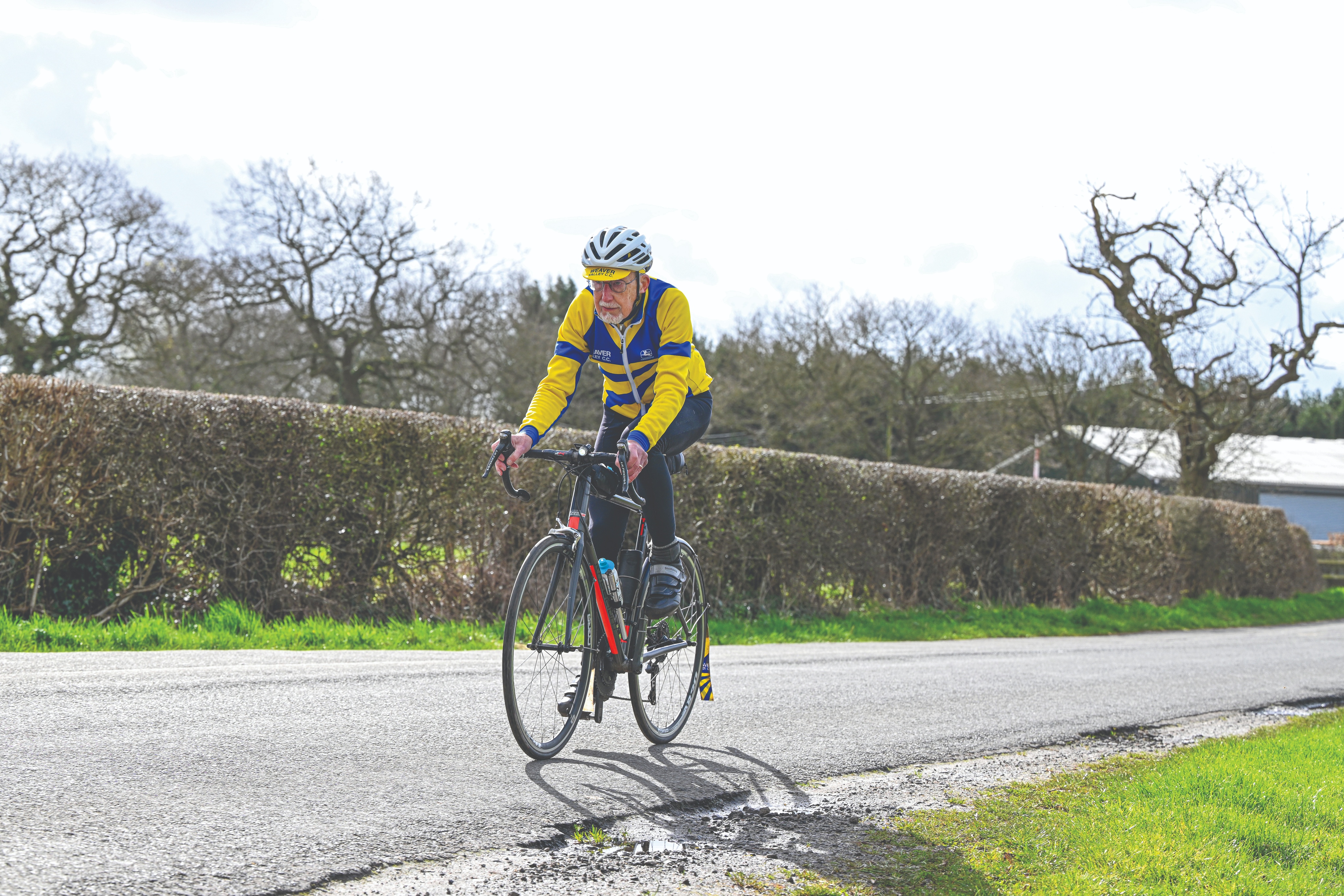
Whyard returned to cycling in 1987. “Prior to that I’d ridden during my teens and was the third man in a 30-mile competition record-breaking team back in 1963,” he explains. Work and family commitments then took priority, but the physical benefits, sociality and being out in the countryside lured him back into the saddle. “One of the things you’re fighting against as you get older is that your heart rate diminishes with age. Twenty years ago my maximum was 190bpm, now it’s around 149bpm – and that’s on a good day!”
Whyard has plenty of good days when it comes to clocking up a decent mileage. “I prefer to cycle outdoors and I try to get out at least three days a week. I’ll do rides up to about 85 miles and ride with my local club Weaver Valley CC. Over a week I cover 170-180 miles. When the weather’s poor, I’ll use my indoor trainer, doing anything from 30 to 90 minutes at a time.”
It’s no longer about getting faster. “I’ve noticed the impact of ageing on club rides. When I first retired, I was riding with the faster guys at 16-17mph. Now, with the slow group, we’re lucky if we manage 13mph,” he smiles. “But I’m still doing 170-180 miles every week.”
Mark Wedgwood, 56, Hathersage, Peak District
- Cycled through all 204 OS Landranger maps in numerical order – total of 7,300 miles (2022)
- Cycled across North America, linking the paired communities of Boring, Oregon and Dull, Scotland via Iceland and Ireland (2023)
- Land’s End to Orkney – 1,100 miles in 10 days (2008)

“I’ve always cycled and enjoyed adventures around Britain, including an end-to-end, several coast-to-coasts and trips to the Hebrides,” says Wedgwood, who started his 2002 Ordnance Survey Landranger ride on map number one, from Unst, one of the northern Shetland Isles.“
That was on 9 May [2022]. I then rode the maps in numerical order to number 204 – south-east Cornwall. I finished in Fowey, Cornwall on 28 November. Highlights included cycling at 11pm on a summer night in the Scottish Highlands while the sun was still shining. You feel very small in a very big landscape.
“I am very lucky that nothing apart from my own inertia has ever really stopped me from cycling for physical or mental reasons,” says Wedgwood. “In the months building up to my North America ride, my training rides could be up to 500 miles a week. I also started doing walks of marathon length – that led to doing a couple of ultra events, 50 miles and 100km, which took me into territory I never imagined I would go.”
Last winter, Wedgwood was unable to ride as much as he would have liked. “But I have done a couple of 100-mile rides to keep my hand in, and several much shorter, hillier ones in my local area. Cycling is a huge part of my life. There are endless adventures still to be had and I want to see everywhere.”
Mike Twelves, 60, Leicester
- Masters Track World Championships: silver, individual pursuit (2019)
- 2x bronze, individual pursuit and points race (2022)
- 4x gold, individual pursuit, points race, scratch race, team pursuit (2023
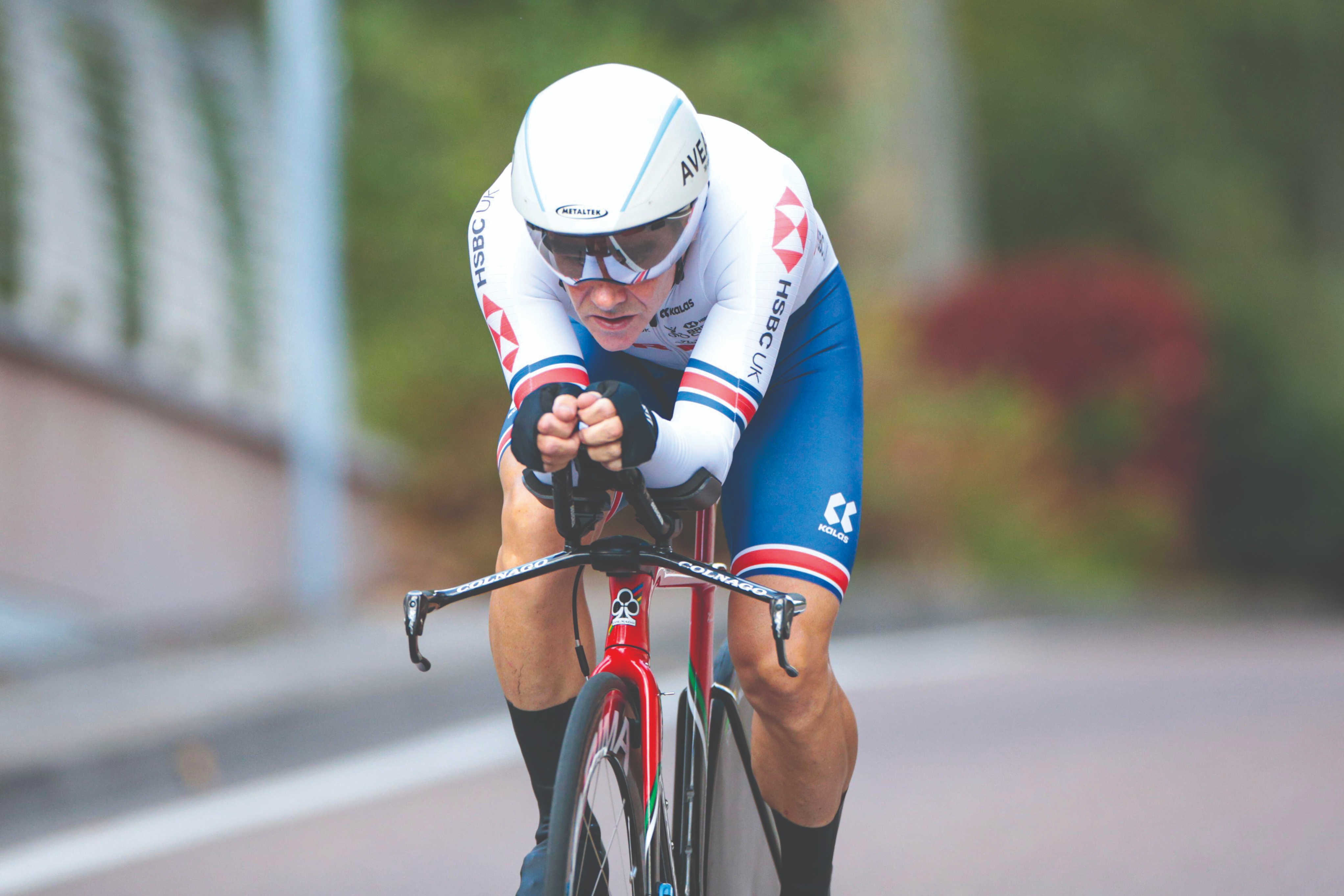
Aged 48, Twelves came out of his cycling ‘retirement’. “When I was in my teens, what always worked for me was simply lots of bike riding – what everyone now calls Zone 2. Back then, the goal for each year was to be faster than I was the previous year. At my age now, the goal is, can I go no slower this year than I went last year?”
In 2023 Twelves managed to win four World Championships at the Masters Track Worlds in Manchester. “ The year before that, I’d won the team pursuit with fellow Team Ohten Aveas rider Richard Oakes in LA – repeating what we’d done in 2019.”
What are the secrets to his success? “I enjoy following my own training plan but I’ve been riding long enough to know, probably within the first mile, whether I’m going to be able to achieve what I’ve set out to do that day. You have to listen to your body and not follow the plan at all costs. There’s always tomorrow’s session.”
Lucy Flower, 55, Hull
- Coast-to-coast over three days (2014)
- 2x Way of the Roses over two and three days respectively (2016, 2021)
- Lincoln Grand Prix (2022)
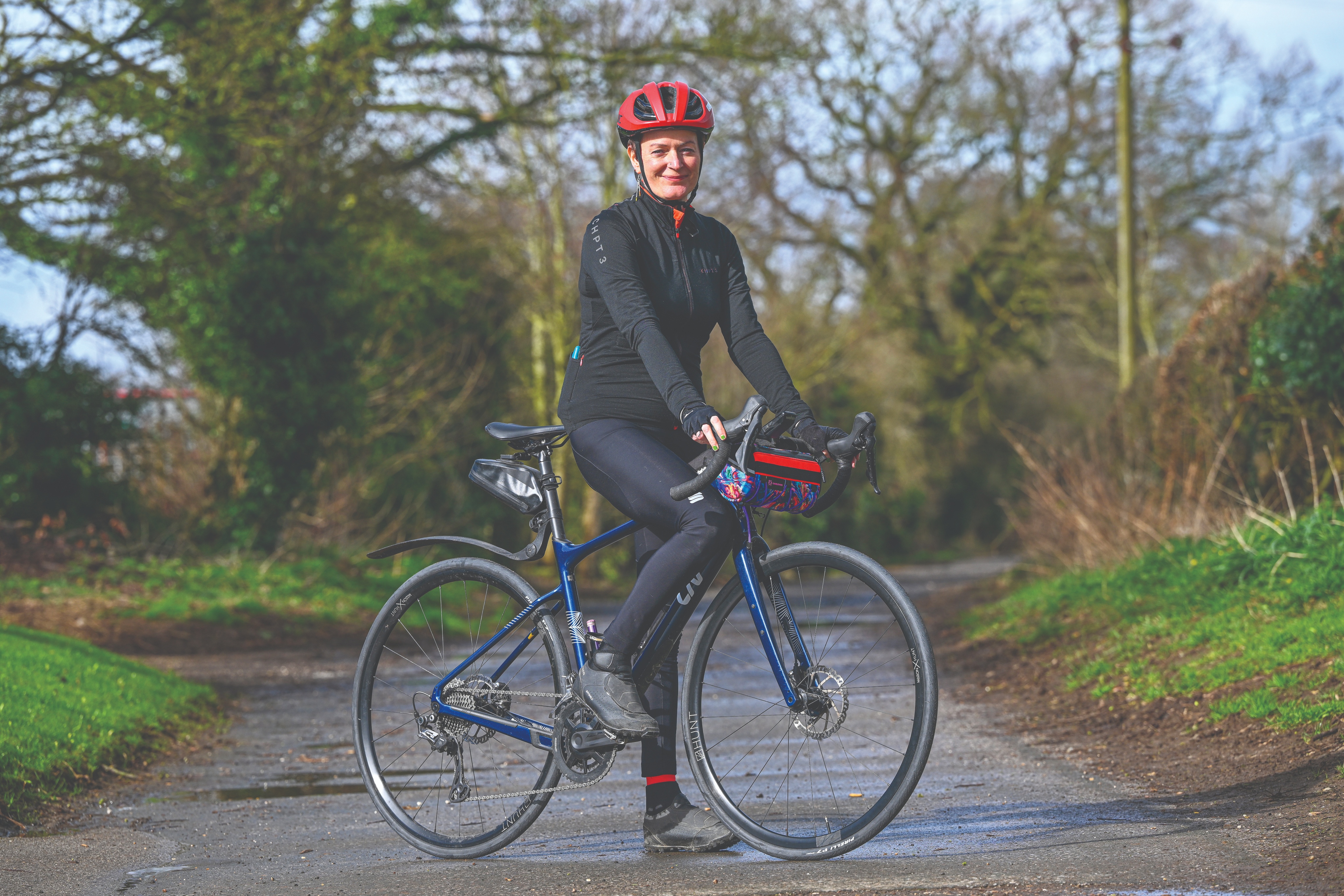
“For years I scoffed at the Lycra-clad roadies, but I gradually got sucked into their world,” says Flower. “Now I have three road bikes, plus a gravel bike and the inevitable turbo. Cycling is my escape, my therapy and my social life. I’m definitely more scared of falling off and injuring myself badly as I’ve got older, but I just love riding and I don’t have to force myself to go out.”
Flower says that cycling’s easy on-the-joints cardio benefits are a major motivation too. “It’s amazing how quickly your fitness improves with regular rides.
“I’d highly recommend doing some strength training to supplement your cycling, though, especially for women as we go through the menopause. It makes a massive difference.”
Carolyn Spiers, 65, Bolton
- 3rd FV65, Masters World Cyclo-Cross Championships
- 7x winner of supervet category in National XC MTB series
- 2x winner of FV60 category in National Trophy CX series
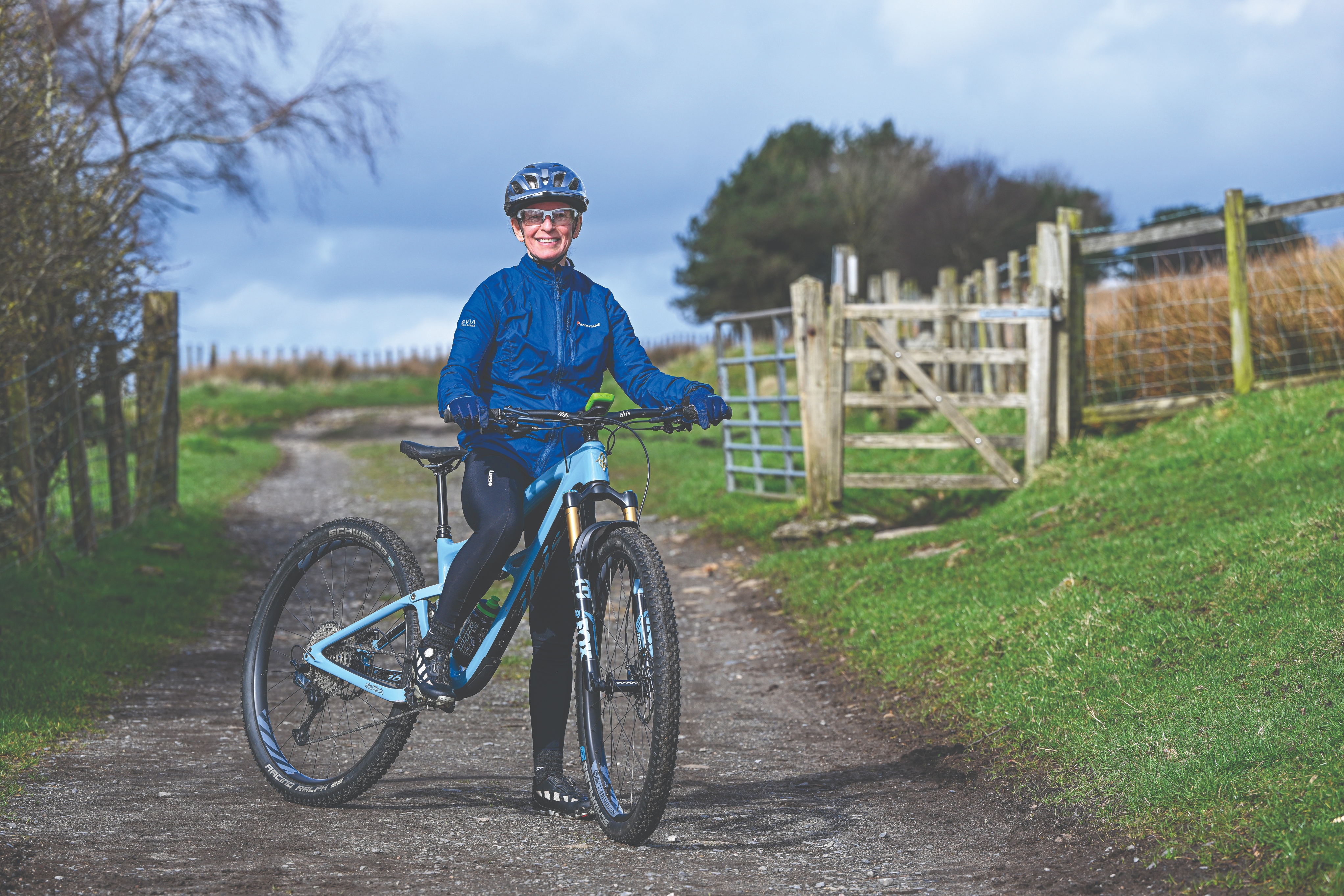
“A typical week’s training for me includes some easy riding, one or two interval sessions and a longer two to four-hour ride or a recreational day out,” explains Spiers, who took up serious cycling in her late 40s, entering national MTB events in her 50s and doing cyclo-cross to keep fit through the winter.
“I also do some core conditioning exercises and some weights, and I’d say the key challenge for me these days is thinking I’m 35, not 65,” laughs Spiers. “I certainly feel stiff and tired every morning – but I see that as a reason to get up and keep active.” Spiers says she’s in denial about the physiological changes. “I try not to notice the declining power, bone density and slower recovery. Also, many women really struggle with post-menopausal weight gain, which is difficult when you’re already tired.”
But for Spiers the psychological benefits rate highly. “Definitely I feel the benefits cycling bring – the quality of life and new opportunities. Cycling is a friendly, welcoming sport where race events are social occasions.”
Walter Fowler, 90, Staffordshire
- Oldest rider in the UCI Masters Track World Championships
- 8x track world records (including V85-89 Hour record of 34.602km)

Walter Fowler clinched his third world title at the Masters Track World Championships in Manchester in October 2023 and currently has his sights on setting new records in the 90- 94 category. “When I rode in a velodrome for the first time, I was too scared to ride to the top of the track. I’m still motivated by the excitement of track racing – even though masters racing is usually quite lonely with small audiences.”
Fowler praises the camaraderie and fellowship that comes with cycling. “It’s a mental benefit to be with a team,” says Fowler, “especially when they give you a nice surprise as I had in 2012 when a group of younger riders gave me a ‘makeover’. I had already won the 500m TT championship in an empty arena previously but other cyclists felt I hadn’t done myself justice. They spruced up my bike, upgrading the wheels, and gave me a better skinsuit and aero helmet. I was invited to ride the 500 again in a record attempt. It being a Saturday, quite a crowd attended, and the roar that built up as I approached the finish is an experience I’ll never forget. The record was improved by 1.6 seconds.
“I’m usually the oldest rider in the championships and hold three current records in the 85-89 category – 43.104 for the 500m, 3.04.9 for the 2km pursuit, plus 34.602km for the Hour. But you can’t get world records if you don’t take things very seriously or leave things to chance,” he adds.
“I was diagnosed and treated for bladder cancer in 2009/10. That kept me off the bike for a while – although on recovery, I competed in Portugal in 2010. The clinicians I spoke to remarked on how my physical fitness was a key factor in my ability to recover from the cancer. One of the most important benefits of cycling is that it does keep your body in a good fit condition to withstand the rigours of life that are bound to come.”
Kath Lyons, 78, Skipton, North Yorkshire
- LEJOG solo (summer 2023)
- 2x Jo Cox Ride, Yorkshire to London (26-30 July 2023)
- Coast-to-coast, Wolds Way
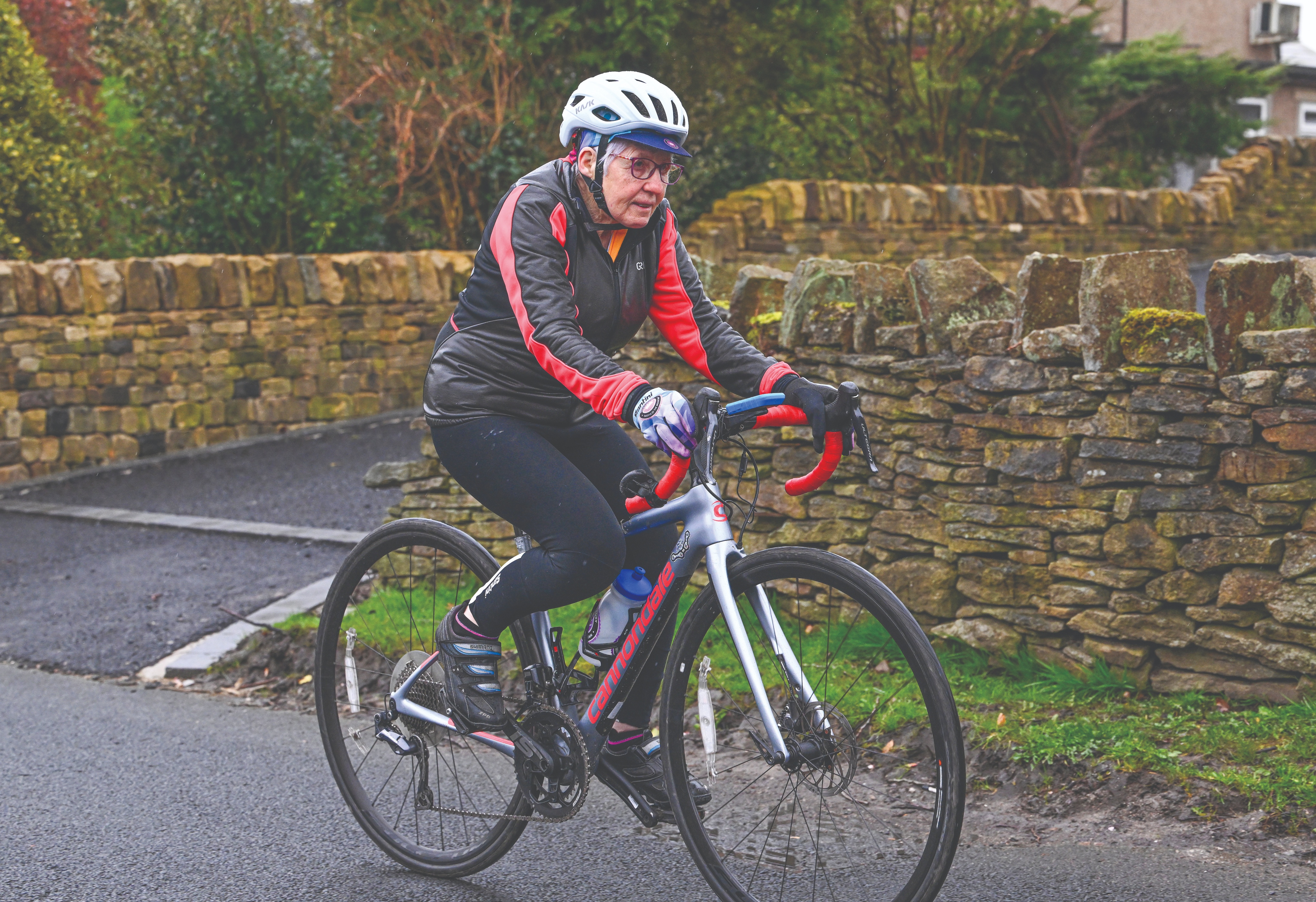
“I’m coming up to my 80s and I’ve no intention of stopping cycling,” says Lyons, who rides with two clubs, Queensbury Queens, a 180-strong all-female members group, and Ilkley Cycling Club. “I came to cycling very, very late – I was 67, an age when many are probably thinking of giving it up.
“I was inspired by the Tour de France when it came to Yorkshire in 2014. It made me want to ride on the road so I joined the beginners at Ilkley.”
For Lyons, the social element of cycling is a big mental health boost. “Cycling with a mix of ages gives you another perspective on life – it helps your mind stay young. Physically I’ve found electronic gearing a real bonus for older people who – like me – may have some form of arthritis.”
‘Bolster your bones and eat more protein’
Oli Williamson, physiotherapist with Marylebone Health, urges older cyclists to work hard on maintaining strength. “As we age, the natural decline in muscle mass (sarcopenia) and bone mineral density (osteopenia or osteoporosis) can profoundly affect cyclists,” says Williamson. Sarcopenia leads to reduced muscle strength and endurance, while decreased bone density increases susceptibility to fractures, particularly in the hip, spine, and wrist. “To mitigate these effects, strength training is crucial. Physiotherapists recommend incorporating strength and conditioning sessions – two or three times weekly – focusing on compound exercises like squats, leg press, and single-leg movements. For bone health, exercises such as bar bell back squats and dynamic movements like box landing and hopping are beneficial.”
Williamson’s colleague at Marylebone Health, James Moran, provides the following advice on optimum nutrition choices for older cyclists. “As muscles become ‘anabolically resistant’ with age, consuming higher amounts of dietary protein is essential to stimulate muscle protein synthesis,” he says. “Incorporating protein-rich foods like milk, yoghurt, cottage cheese, meat, fish, and eggs alongside resistance training is crucial. For plant-based cyclists, larger portions of plant protein sources may be needed, with supplements like soya or pea protein powder being beneficial,” he adds. Include around 40g of protein per meal. Recreational cyclists often under-consume protein. “During long rides, small protein-rich snacks such as protein bars, or shakes from protein powder, can help prevent muscle breakdown. Additionally, consider calcium, omega-3, vitamin D, and potentially creatine supplements.”
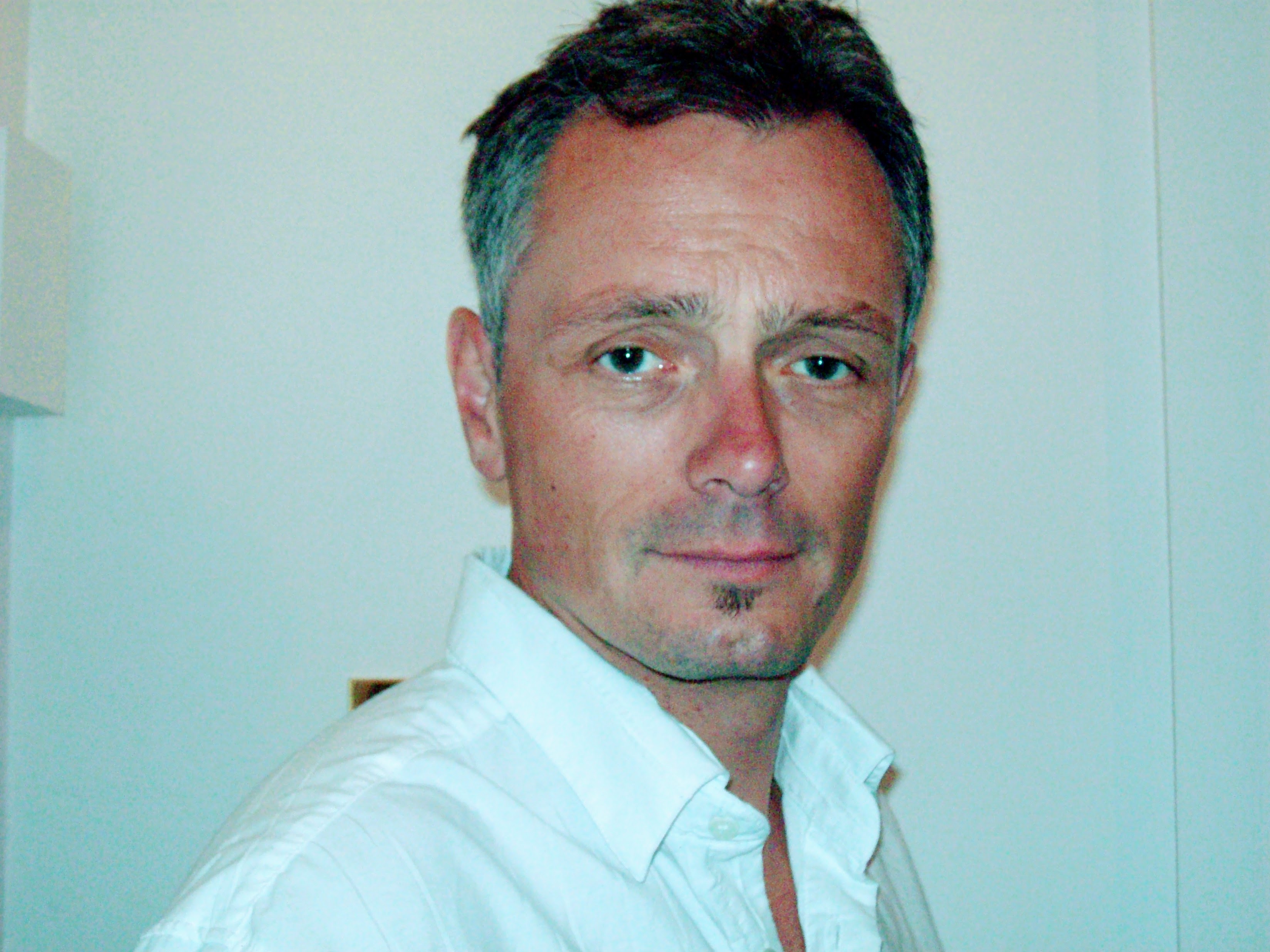
Rob Kemp is a London-based freelance journalist with 30 years of experience covering health and fitness, nutrition and sports sciences for a range of cycling, running, football and fitness publications and websites. His work also appears in the national press and he's the author of six non-fiction books. His favourite cycling routes include anything along the Dorset coast, Wye Valley or the Thames, with a pub at the finish.